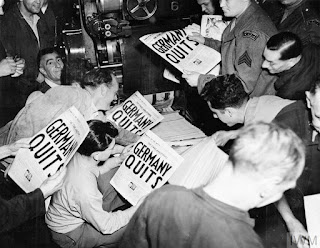8 May 1945 – VE (Victory in Europe) Day – was one that remained in the memory of all those who witnessed it. It meant an end to nearly six years of a war that had cost the lives of millions; had destroyed homes, families, and cities; and had brought huge suffering and privations to the populations of entire countries.
Millions of
people rejoiced in the news that Germany had surrendered, relieved that
the intense strain of total war was finally over. In towns and cities across
the world, people marked the victory with street parties, dancing and singing.
But it was not the
end of the conflict, nor was it an end to the impact the war had on
people. The war against Japan did
not end until August 1945, and the political, social and economic repercussions
of the Second World War were felt long after Germany and Japan surrendered.
Here's what you need to know about VE Day and how it was marked in Britain and around the world.
PHOTOGRAPHS
Germany signed
an unconditional surrender
With Berlin
surrounded, Adolf Hitler committed suicide on 30 April 1945. His named successor
was Grand Admiral Karl Dönitz. During his brief spell as Germany’s president,
Dönitz negotiated an end to the war with the Allies – whilst seeking to save as
many Germans as possible from falling into Soviet hands.
A German delegation
arrived at the headquarters of British Field Marshal Bernard Montgomery at
Lüneburg Heath, east of Hamburg, on 4 May. There, Montgomery accepted the
unconditional surrender of German forces in the Netherlands, northwest Germany
and Denmark. On 7 May, at his headquarters in Reims, France, Supreme Allied
Commander General Eisenhower accepted the unconditional surrender of all German
forces. The document of surrender was signed on behalf of Germany by General
Alfred Jodl and came into effect the following day.
Soviet leader Josef Stalin wanted his own ceremony. At Berlin on 8 May, therefore, a further document was signed – this time by German Field Marshal William Keitel. Dönitz’s plan was partially successful and millions of German soldiers surrendered to Allied forces, thereby escaping Soviet capture.
PHOTOGRAPHS
Germany’s surrender
was not a surprise
The news of
Germany’s surrender was not surprising. It had been anticipated for some time
and people across Britain were on standby to start celebrating the end of the
war.
The announcement that the war had ended in Europe was broadcast to the British people over the radio late in the day on 7 May. The BBC interrupted its scheduled programming with a news flash announcing that Victory in Europe Day would be a national holiday, to take place the following day. Newspapers ran the headlines as soon as they could, and special editions were printed to carry the long-awaited announcement. The news that the war was over in Europe soon spread like wildfire across the world..........
https://www.iwm.org.uk/history/what-you-need-to-know-about-ve-day


No hay comentarios:
Publicar un comentario